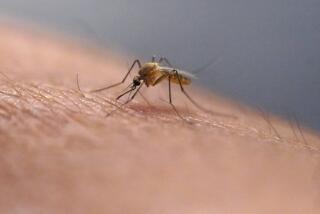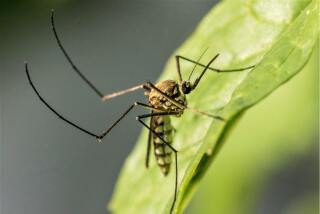Don’t let yard be a nesting spot for disease
- Share via
No one likes mosquito bites. They itch, they fester, and now they can also spread a disease called West Nile virus. No reason to panic -- the disease is rarely fatal to humans. But people who spend a lot of time outdoors, gardeners included, should take precautions.
“Eighty-five percent of people with the disease show no symptoms at all,” says Robert Saviskas, executive director of the L.A. County West Vector Control District. According to Saviskas, 15% get aches, pains and headaches, like a mild flu. Fewer than 1% experience severe symptoms, including fever, rash and neurological problems. People with compromised immune systems, chemotherapy patients and diabetics are affected most.
In a nutshell, the best way to avoid discomfort and disease is to prevent being bitten. Small changes in your landscape and your behavior can make a big difference.
Start by eliminating all standing water. Without it, mosquitoes can’t breed, and they don’t need much.
“An inch is all,” says Gail Van Gordon, public health entomologist for the Los Angeles County Department of Health Services. In warm-enough water, the passage from egg to adult can occur in a matter of days.
Canvas your property carefully, and remove anything that catches and retains rain or irrigation water. Empty saucers under just-doused potted plants, and check saucers after running your sprinklers. Change water in bird baths every other day. Check spigots, valves and other water equipment for leaks.
“And be careful about the amount you apply,” Van Gordon says. “Don’t water until it pools on the soil. Watch low spots and places with bad drainage, and correct them, if possible.”
Ornamental ponds, water features and unused swimming pools can become mosquito maternity wards. Fortunately, two very effective nontoxic methods of population control can be used.
Little mosquitofish (Gambusia affinis), available free from many counties’ vector control districts, feed on mosquito larvae at the water surface. (Note that mosquitofish are not native and don’t belong in natural water systems; never dump them into curbside gutters, streams or lakes.)
Mosquito rings that float and dissolve in water are laced with bacteria that kill mosquito larvae and nothing else. They are especially good for drainage pipes where water can collect unseen. The rings are sold at many nurseries and home and hardware outlets.
Inevitably, hungry mosquitoes are bound to find you as you garden, attracted by the carbon dioxide you exhale and the lactic acid in your perspiration. And especially in early morning and early evening, when, Saviskas says, the females are genetically wired to look for their blood meal, which they must have before they can breed.
“If possible, reschedule your work times, and wear long sleeves and long pants,” Saviskas advises.
Experts agree that mosquito repellents should be used. “In this climate, we plant and tend our gardens all year long,” Van Gordon says. “Mosquitoes are active and the virus can circulate at very low levels year round.”
Products containing DEET (N,N-diethyl-m-toluamide) are very effective and long-lasting, but some experts consider the chemical too risky to use. Soy-based and herbal repellents also work but must be applied more often. Be sure to read and follow the directions precisely, and you’ll get the protection you need.
A final note: Although West Nile virus rarely kills humans, horses are extremely vulnerable, with a 30% to 35% mortality rate. There is, however, an effective vaccine for the noble beasts.
“All horses should be vaccinated immediately,” says Van Gordon, a gardener and horsewoman, “and get booster shots every six months.”
*
Four agencies that can help
To obtain mosquitofish, report dead birds that might be carrying West Nile Virus, or for more information, contact the following numbers and websites:
* Los Angeles County West Vector Control District (www.lawestvector.org); mosquito complaints and mosquitofish: (310) 915-7370.
* Los Angeles County Department of Health Services (lapublichealth.org/acd/VectorWestNile.htm).
* California West Nile Virus Surveillance Information Center (west nile.ca.gov); to report dead birds: (877) 968-2473.
* Centers for Disease Control and Prevention (www.cdc.gov/ncidod/dvbid/westnile/index.htm).






